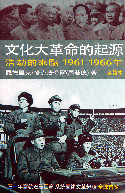文化大革命的起源:浩劫来临 1961-1966年
Goodreads
The Origins of the Cultural Revolution, Volume 3
Roderick MacFarquhar
简介
This is the final volume in a now-classic trilogy that seeks an answer to this question as it examines the politics, economics, culture, and international relations of China from the mid-1950s to the mid-1960s. Drawing upon new evidence from Chinese Party reports, personal interviews, books, and journals, this volume illuminates the struggle between Mao and his colleagues over the nature and direction of China's post-revolutionary society. Presenting the ebb and flow of the Party's authority as a function of Mao's political will, Roderick MacFarquhar shows that the Chairman's actions were due less to his fear that the Party would wrest control from him, than to his refusal to let go, at any cost, of his vision of China as the vanguard revolutionary state.
explores the important events leading up to the Cultural Revolution, from the Central committee's Ninth Plenum—marking the end of Mao's Great Leap with its economic and human cost—to the launching of the Socialist Education Movement; the split of international communism, and the dissolution of the Yan'an Round Table after the fateful publication of the Twenty-three Articles, which contained a chilling warning against high-level leaders taking the capitalist road. Against the background of such divisive issues as extreme collectivization, nationwide famine, industrial downsizing, and massive de-urbanization, MacFarquhar traces the rift between Mao and the Party over what Mao saw as counter-revolutionary methods—scaling back collectivization, transferring power from Party secretaries to factory managers, stressing education over ideology, and recognizing the need for better relations with the outside world. MacFarquhar details the struggles of chief deputies such as Liu Shaoqi, Zhou Enlai, and Deng Xiaoping as they worked to bolster China's failing economy while constrained by Mao's defiant policy of national self-reliance and the inexorable "Three Red Banners" of the Great Leap. From the Ninth Plenum in 1961 to the publication of the Twenty-three Articles in 1965, MacFarquhar argues, Mao continually tested the Party. Although no one rose to challenge his leadership, he eventually lost confidence in the Party's ability to change society and to realize a communist utopia. On the eve of the Cultural Revolution, Mao—made resolute by the Sino-Soviet split and the Party's acceptance of the status quo—was ready to "unleash society to change the Party."